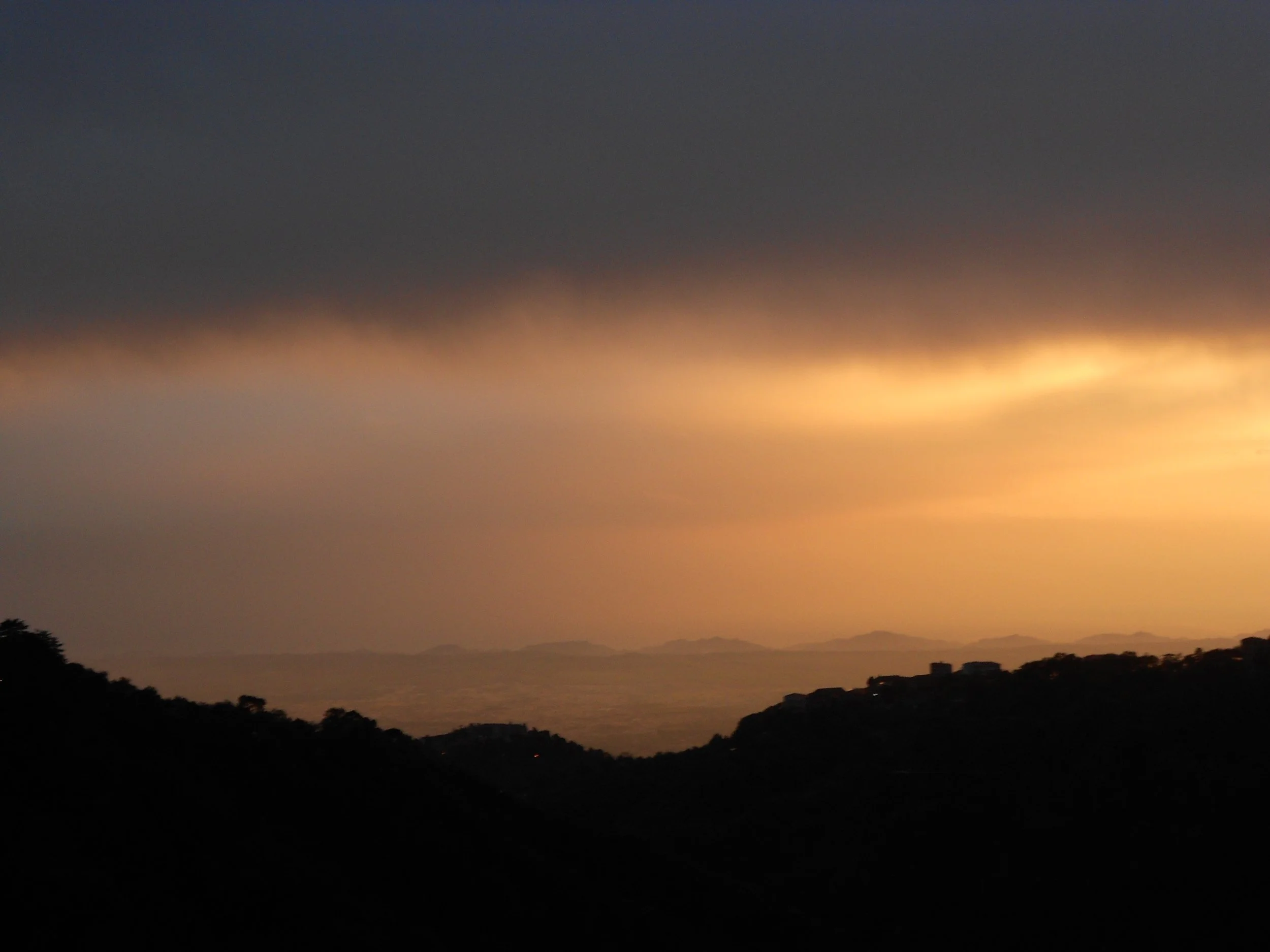Prayers to Peace: Three poems by Smita Agarwal
Photo: Karan Madhok
Poetry: ‘The dahlias grow hawa mey— / off the air, we’d say / Down steep ravines / into which the monsoon // munificence would flow’
Friday 20th Sept. 1996
There were no smart-phones.
The photos are dark and dingy.
Mussoorie was clouded.
Father lies prone on his bier
on the shingles
Brother is stuffing cotton wool
in his nostrils.
Kajal, Father’s Boxer, refuses to
leave his side.
The dog has a panicked look.
Antara is a year-old baby
in a blue frilly frock.
It is September. “Minerva”
is shawled in green;
the dock leaves, fresh and turgid
in the fast-fading monsoon;
the rocks, strong, against
the grey sky.
No one is wailing
as the body is carried out
of the premises,
out and down to Haridwar.
There is another dull pic
of Mom in the doorway
bidding goodbye to forty years
of her life; erect, firm, dry-eyed.
Only Kajal growls, whines, pants
runs after the arthi all the way
to the Mall Road gate: unable to
comprehend why her Master
does not get up, does not say
Stay, Kajal! Stay!
*
Rasoi
I see: an old colonial bungalow
22 Albert Road (yes, yes, the Albert of Queen Victoria).
Tiled roof, large rooms, acres of land where grandfather
farms vegetables and wheat.
The house is overflowing
ringing with voices while, a grandmother
almost divine with 90 arms
and 110 feet is making it all tick.
Here is the rasoi, a large, dark room
soot-stained, aromatic, a single window
on the far side. Coal and wood fires
smack and crackle, commanding cauldrons
to spew enough to feed the resident army.
This is the centre, the heart, essence, juice
taste, flavour; the seat where everything cooks.
We sit on low wood-stools called peerdha
and eat. First the children, then,
the young adults, next, grandfather and
his cousins and lastly, grandma and her widowed
mums-in-law, grandad’s sisters.
When the children eat, there is complaining
cajoling, beseeching and scolding. The young adults
mostly giggle and argue. They debate over Dharma Mamu
leading a large group of university students shouting
Angrezi hatao while defacing shop-signs and name-plates
smearing black on entrance and door. I hear, names
bandied about. I savour the flavour of heard sounds
Lohia, Bajpayee, Karunanidhi, Annadurai.
When grandad and his cousins eat, there is an air of
etiquette, decorum, formality. Justice Desai’s dinner
is discussed, where shahi tukda served alongside
steamed Christmas pudding, while Justice Broome’s
judgement in support of the fundamental rights
of prostitutes is gently critiqued. When the women
eat, the conversation is more about sharing leftovers
each others’ health, ways and means of dealing with
the rogue househelp, Kushala and Hayat Singh.
It is 5 am. I have to pee. As Mum drags me
across the courtyard to the toilet at the far end
I see coal rock being broken into small pieces
for the angeethi. A little kerosene, some wood shavings
crumpled newspaper, ceaseless fanning. Solid grey
smoke gurgles out. It shall be a while before
the stove-in-a-tin-bucket is lifted into the rasoi.
On it shall smelter, yellow daal topped with ghee
to be served with hot rice and sabzi. This is family
in the sixties wound around the rasoi.
Flavours fade fast as taste-buds mutate.
“Please don’t come today; I’ve a project to complete”,
scream the utensils into mobile phones. “Ah! if you
must come, bring along a pizza and I’ll open a bottle
of wine... You must leave by nine. I have a PPT to submit.”
In this smokeless, modular kitchen, Corelle and La Opala
gleam and glow; conversations about individual space
self-love, flow rapidly waiting for the timer to beep nine
kickin’-out-time
time stipulated for me to go.
*
Prayer Flags
Wild dahlias nod in the breeze.
It is October. The rains have
receded. The hillside is green.
I see: two girls in short frocks
with one urchiny boy
scampering up the hill
black dog in tow.
The dahlias grow hawa mey—
off the air, we’d say
Down steep ravines
into which the monsoon
munificence would flow,
along the sides where a
handful of mud, humus,
driftwood, would get stuck
year upon year, flocks
of dahlia, pink, yellow
burgundy, white; the children
wondering who sprinkled the
seeds, who invited the flowers
to spread their colour to incite
the child’s mind with wonder
thwack the heart with sudden joy
Tip-toeing with the rain
wildly swaying to the wind
precarious, surviving all manner
of disasters, these prayers to peace
in a world where the clang
of clash refuses to ease.
***
Smita Agarwal belongs to Mussoorie. She has been publishing poetry since the last 50 years. She is the author of three collections of poems: Wish-Granting Words (2002), Mofussil Notebook (2016), and Speak, Woman! (2021). You can find her on Twitter/X: @allahabadpoet and Instagram: @smita251158.

